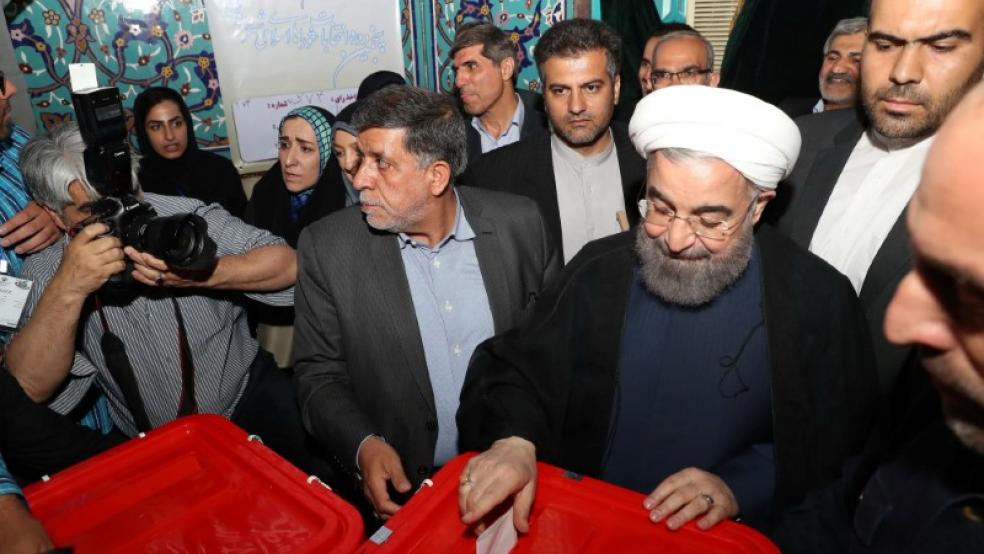TEHRAN (Reuters) - Iranian President Hassan Rouhani and reformist partners won a big vote of confidence in elections that could speed up Iran's emergence from isolation, and a key ally told long dominant hardliners to accept that voters wanted them to step aside.
The polls for parliament and a leadership body were seen by analysts as a potential turning point for Iran, where nearly 60 percent of its 80 million population is under 30 and eager to engage with the world following the lifting of most sanctions.While advances by moderates and independents in Friday's polls were most evident in the capital, the scale of the gains in Tehran suggests a legislature more friendly to the pragmatist Rouhani is now a distinct possibility.Top Rouhani ally Akbar Hashemi Rafsanjani, a shrewd political fixer and veteran pro-reform figure, urged hardliners not to stand in the way. "No one is able to resist against the will of the majority of the people and whoever the people don't want has to step aside," he said in a message on Twitter, referring to the contest for the 290-seat parliament and 88-member Assembly of Experts. A loosening of control by the anti-Western hardliners who currently dominate both bodies could strengthen Rouhani's hand to open Iran further to foreign trade and investment following last year's breakthrough nuclear deal.In his first comments since the elections, Iran's deeply anti-Western Supreme Leader Ayatollah Ali Khamenei, praised the high turnout but made no direct comment on the results. However in a statement he appeared to set out the values he would like to see in the newly elected bodies, suggesting they should not be influenced by the West."Advancement doesn’t mean getting absorbed by global arrogance", he said, using a term for the United States.A more toughly worded comment came from hardline judiciary chief Ayatollah Sadeq Emoli Larijani, who accused reformists of working with "American and English media outlets" to block hardliners from winning seats the experts assembly."Is this type of coordination with foreigners in order to push out these figures from the Assembly of Experts in the interests of the regime?" he said in a statement.The Islamic Revolutionary Guards Corps, a powerful hardline paramilitary organization close to Khamenei, issued a statement praising the turnout and implicitly accepting the results, but it too described the anti-U.S. stance it would like to see."The election winners will do their best to protect Iran's dignity, power and independence; resolve the main issues for society and the people; and defeat the global arrogance by their awareness and wisdom," it said, referring to the United States.A reformist-backed list of candidates aligned with Rouhani was on course to win all 30 parliamentary seats in Tehran, initial results released on Sunday showed. Top conservative candidate Gholamali Haddad Adel was set to lose his seat, preliminary results showed."The people showed their power once again and gave more credibility and strength to their elected government," Rouhani said, adding he would work with anyone who won election to build a future for the industrialized, oil-exporting country.Principlists, otherwise known as hardliners, hold 65 percent of the outgoing parliament and the rest is divided between reformists and independents who traditionally support Rouhani."It is a very big victory," said analyst Saeed Leylaz who was an adviser to former reformist President Mohammad Khatami."It is very good news for President Rouhani. We will have a very rational parliament, a less factional parliament, a more expert and technocrat parliament."Tens of millions crowded polling stations on Friday to vote for parliament and the experts assembly, which selects the country's highest authority, the supreme leader. Supporters of Rouhani, who promoted the nuclear deal, were pitted against hardliners close to Khamenei, who are wary of detente with Western countries. ACUMENRouhani and Rafsanjani led the race for the experts assembly with most votes counted, and appeared to be sure of winning seats, early results released on Saturday showed.The contest may prove crucial. Because of Khamenei’s health and age, 76, the new assembly members who serve eight-year terms are likely to choose his successor. The next leader could well be among those elected this week.Rafsanjani is among the founders of the Islamic Republic and a former president. Often at the center of Iran's intricate webs of power, he is famous for his pragmatism and political acumen.In backing such a dealmaker, the reformists hoped that in alliance with moderate conservatives and independents they would be able to block the three main ultra-conservative leaders - Ahmad Jannati, Mohammad Yazdi and Mohammad Taghi Mesbah-Yazdi - from emerging as Khamenei’s successor.Early results suggested some of that goal was met.Just one prominent hardliner was on course to be elected in the experts assembly race in Tehran -- Jannati, in 15th place out of the 16 seats reserved for the capital's candidates. The assembly's current chairman, Mohammad Yazdi, in 17th, and the arch-conservative Mesbah-Yazdi, in 19th, appeared unlikely to win a seat, according to partial results.Mesbah-Yazdi is a fierce critic of reformists and has even advocated violence against its supporters. INFLUENCEA Reuters tally, based on official results published so far, suggested the pro-Rouhani camp and allied independents were leading in the parliamentary vote. Some moderate conservatives, including current speaker Ali Larijani, support Rouhani.Reformists had nearly 25 percent, independents 21 and principlists 36, according to calculations based on final results, excluding Tehran where results remain preliminary.Eighteen percent of candidates will have to go to run-offs in late April because nobody won the required 25 percent of votes cast. Over a dozen of the initial winners were women.Analysts say the large number of independents may be significant as they could cooperate across ideological lines with Rouhani's government. But whatever the outcome, Iran's political system places much power in the hands of the conservative Islamic establishment including the Guardian Council, which vets all laws passed by parliament. (Additional reporting by Bozorgmehr Sharafedin, Sam Wilkin and Parisa Hafezi; Editing by William Maclean and Anna Willard)Iran's Rouhani welcomes poll wins that could mean faster reform

HANDOUT



